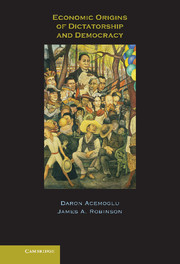Book contents
- Frontmatter
- Contents
- Preface
- PART ONE QUESTIONS AND ANSWERS
- PART TWO MODELING POLITICS
- PART THREE THE CREATION AND CONSOLIDATION OF DEMOCRACY
- PART FOUR PUTTING THE MODELS TO WORK
- 8 The Role of the Middle Class
- 9 Economic Structure and Democracy
- 10 Globalization and Democracy
- PART FIVE CONCLUSIONS AND THE FUTURE OF DEMOCRACY
- PART SIX APPENDIX
- Bibliography
- Index
10 - Globalization and Democracy
Published online by Cambridge University Press: 05 September 2012
- Frontmatter
- Contents
- Preface
- PART ONE QUESTIONS AND ANSWERS
- PART TWO MODELING POLITICS
- PART THREE THE CREATION AND CONSOLIDATION OF DEMOCRACY
- PART FOUR PUTTING THE MODELS TO WORK
- 8 The Role of the Middle Class
- 9 Economic Structure and Democracy
- 10 Globalization and Democracy
- PART FIVE CONCLUSIONS AND THE FUTURE OF DEMOCRACY
- PART SIX APPENDIX
- Bibliography
- Index
Summary
Introduction
In this chapter, we discuss how globalization of the world economy might affect democracy. The framework developed so far shows how the emergence and survival of democracy depends on the distribution of income and, by this channel, factor prices. Globalization, in the form of increased international trade and/or increased financial integration, affects factor prices and income levels, and hence, it may have an important effect on democracy.
Many scholars have conjectured the existence of different connections between globalization and democracy, and the recent empirical literature in political science has begun to investigate some of the links. This literature finds significant correlations between democratizations and changes in the international economy. For example, Quinn (1997, 2002) shows that since the 1960s, measures of democracy averaged across countries are highly correlated with measures of capital and current account liberalization. Yet, this literature (Kubota and Milner 2005) has focused on the effects of democracy on international liberalization (seen as a subset of more general liberalization).
To discuss the potential effects of globalization on democracy, we distinguish three dimensions of “globalization”:
increased international trade (market integration)
increased financial integration
increased political integration
In this chapter, we treat these different facets of globalization as exogenous to a specific country and not amenable to control by politicians.
- Type
- Chapter
- Information
- Economic Origins of Dictatorship and Democracy , pp. 321 - 348Publisher: Cambridge University PressPrint publication year: 2005



